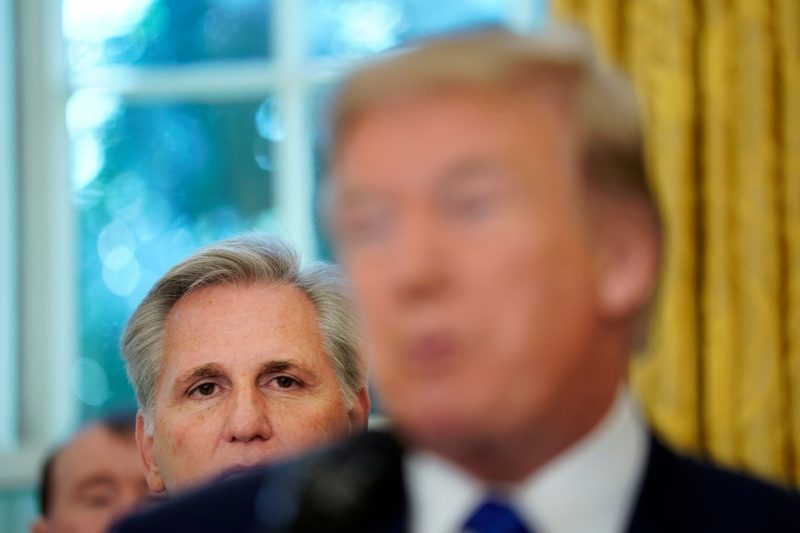The Republican Party has arrived at the place it has long been headed.
In 2008, the Republican nominee for president, Sen. John McCain (R-Ariz.), recognized he had a problem: The Republican voting base wasn’t very enthusiastic about his candidacy. McCain had paid his dues politically and was heir apparent to the nomination. Former Arkansas governor Mike Huckabee had surged to victory in the Iowa caucuses that year, in part thanks to enthusiasm among evangelical Republicans, who were less stoked about McCain. So when the time came to pick a running mate, McCain chose Alaska Gov. Sarah Palin, an unexpected choice hailed as a recognition of a growing center of power in the party: voters who demanded hard-right, media-adept politicians more interested in responding to the base’s whims than in directing them.
McCain lost; Barack Obama won. In short order, an oppositional movement arose on the right focused on attacking Obama and the Democrats. But it was broader than that, of course, also attacking establishment Republicans seen as insufficiently interested in engaging in that same fight — the contours of which moved around depending on what was working in Rush Limbaugh’s tirades or in Fox News’s prime-time shows. Republican leaders managed to harness that energy enough to win the House in 2010.
The GOP establishment’s last unqualified victory came two years later, as former Massachusetts governor Mitt Romney weathered a number of surging opponents to become the party’s nominee. Various other contenders managed to better wrangle the support of the base-commentariat power center, but only briefly, and Romney won. The establishment exhaled, particularly as polling showed that Romney was likely to win in November. And then he didn’t.
In 2014, backlash against immigration provided a point of leverage for the base-commentariat to target and oust House Majority Leader Eric Cantor (R-Va.) in the primaries. A year later, Donald Trump announced his presidential candidacy, one that was directly downstream from the base-commentariat of which he was an unabashed member. The establishment and outside observers scoffed, but Trump’s repeating right-wing rhetoric from Breitbart back to Breitbart readers proved effective. Now it was the base-commentariat candidate who managed to fend off surges from establishment challengers, eventually eking out the nomination. And Trump, thanks in part to having energized the base-commentariat, squeaked by Hillary Clinton in enough states to become president.
Trump’s interest in making himself the center of literally everything led to the creation of a concept called Trumpism, the tactics Trump used to hold power. That is distinct from MAGAism, the specific political appeal Trump made to the base-commentariat. Trumpism was Trump attacking opponents and doing mean tweets. MAGAism is the web of nationalism, racial politics and disdain for the establishment in service of which Trump was tweeting. Both exist outside of Trump — and since Trump’s ouster from the White House, both have been deployed by other Republicans and right-wing personalities to their own ends.
We’ve now arrived at 2023. As of this writing, there is no speaker of the House of Representatives, Rep.-elect Kevin McCarthy (R-Calif.) — until earlier this week the House minority leader — having failed multiple times to secure the votes needed to win election to that office. The reason for that failure is twofold. First, his party’s majority is so narrow that even a few defections make his election untenable. The second is that there is an enormous incentive for defections: praise and attention from the base-commentariat.
McCarthy’s evolution in the post-Jan. 6 political world is fascinating. He was at one point identified as a “young gun” in the GOP, a vision of future party leadership. (So was Eric Cantor.) The idea was that he and his peers (like former speaker Paul D. Ryan (R-Wis.) represented the next generation of the GOP establishment. But McCarthy recognized that being seen as the GOP establishment was not a path for longevity in the party in its new form, and he worked to stake out a position more base-commentariat adjacent. When the comments and conspiracy theories of Rep. Marjorie Taylor Greene (R-Ga.) led to her ouster from committees under Democratic control last year, McCarthy, recognizing her appeal to the base-commentariat, rose to her defense. When supporters of Donald Trump overran the Capitol two years ago, McCarthy privately blasted Trump, then quickly muted his criticism when he began receiving warnings that this was not the base-commentariat stance on the riot.
The problem is in part that McCarthy, trained in the old ways of politics, was seeking out a validator with the base-commentariat, someone who could bring that group along in political fights. But the base-commentariat validates; it isn’t validated. It is the source of power that it confers (often schizophrenically) on others, at times in conflict with itself. Trump convinced himself that his base was his, and, to some extent, a portion of the base-commentariat is Trump’s. But Trump can’t direct the base-commentariat at large. It’s too nebulous and contradictory and mercurial.
Most of those who voted in opposition to McCarthy on Tuesday also supported the effort to block Joe Biden electors in the hours after the Capitol riot, as The Washington Post’s Amy Gardner points out. Not hugely surprising, given that most House Republicans that year did as well. But we can see these votes as being less about Trump than about objecting to Biden and the establishment taking power. Those votes were statements of alliance with the base-commentariat as much as a statement about allegiance to the sitting president.
It’s not surprising that those anti-McCarthy votes also come from a number of people established in right-wing media. Reps.-elect Matt Gaetz (R-Fla.), Paul A. Gosar (R-Ariz.) and Lauren Boebert (R-Colo.) are all at the center of the opposition, appealing to and intertwining with the base-commentariat. McCarthy managed to bring Greene onboard, but she wasn’t able to lure those allies into agreement, given the opportunity for attention that opposition offered.
Trump himself endorsed McCarthy before the initial votes and appeared to be wavering Tuesday night about whether he’d press forward with that support. On Wednesday morning, he renewed his support vociferously in a post on his social media platform, a surprisingly bold declaration of ownership over the outcome. It’s an interesting test of the former president’s power relative to the base-commentariat and one that, in the moment, it seems he’s likely to lose.
McCarthy’s team maintains public optimism, of course. One of the more telling comments came from Rep.-elect Guy Reschenthaler (R-Pa.), who told reporters that he expected elements of the base-commentariat to weigh in on McCarthy’s side.
“We’ll see what happens when Tucker [Carlson] and Sean Hannity and Ben Shapiro start beating up on these guys,” Reschenthaler said of the McCarthy opponents. “Maybe that’ll move it.”
On Tuesday night, the Fox News hosts Hannity and Carlson did, indeed, weigh in on things. But the way in which they did is telling.
Over the course of Trump’s presidency, Hannity, unquestionably part of the base-commentariat, revealed himself to be part of the Trump loyalist faction of that group. His support for Trump came before his bolstering of the base-commentariat in keeping with his long-standing fungibility when access to power availed itself. When Trump became the establishment — triggering some opposition from the rest of the base-commentariat by definition — Hannity stood with the new establishment. So, his broadcast Tuesday offered the lambasting of McCarthy opponents that Reschenthaler expected.
Carlson’s didn’t. He is now the Fox News ambassador to the base-commentariat, whether Hannity knows it or not. So Carlson excoriated McCarthy as a creature of the establishment, which Gaetz was quick to amplify. Backing McCarthy is a way to bolster existing Republican power, but bucking McCarthy is a way of demonstrating opposition to the untrustworthy establishment (Trump’s “swamp”) just as the base-commentariat expects.
McCarthy’s challenge, then, is the challenge of the Republican Party nationally. There is no way to corral the base-commentariat, because it is defined in part by its inability to be corralled. When even Trump is having to learn this lesson, certainly McCarthy will. There’s little he can offer the right-wing fringe in his party, because their acquiescence to him trades power with the base-commentariat for power in the House — and the former offers a lot more power. To become speaker, McCarthy may end up needing support from moderate Democrats, the sort of deal that is anathema to the base-commentariat, if not to Republicans broadly. Securing a leadership post by working with Democrats would further erode his support with his party’s right-most element, imperiling his ability to bring them along on other critical votes he’ll need, given his narrow majority.
This is the terminus of a path the GOP has been walking for at least a decade-and-a-half. Once a Republican base that operated in symbiosis with right-wing media became large enough to wield majority power — a growth stoked by Trump — the prospect of managing a House conference increasingly elected by the base-commentariat became much shakier.
The third “young gun” with Cantor and McCarthy, you’ll remember, was Ryan, who resigned his position after recognizing the impossibility of managing a GOP House caucus that knew Carlson and Twitter offered more power than he did.
The party’s problem, writ small.



























